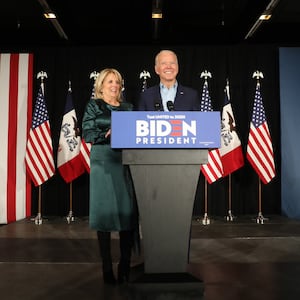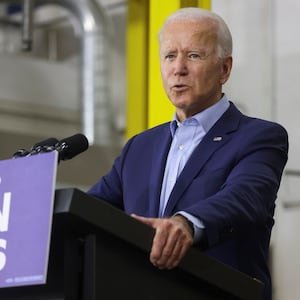When Democrats woke up with sharp pangs of despair following the election of Donald Trump four years ago, a type of conventional wisdom took hold: The party had failed to inspire voters by becoming stale on policy and the tactical elements of politics.
Four years later, Democrats have placed their hopes on the shoulders of Joe Biden, a 77-year-old nominee whose prior runs for the presidency barely inspired anyone and whose brand of politics was, by his own admission, a throwback. If the polls are to be believed, it will prove successful. Biden may have once appeared to be the wrong man for the moment. But his former Democratic opponents now believe that the moment—rife with social discord, economic despair, and a deadly and raging pandemic—became right for him.
“It doesn’t matter who you are, the moment has to meet you,” Sen. Cory Booker (D-NJ), who battled Biden in the presidential primary, told The Daily Beast in an interview. “Trump has been trying to assail him with outrageous accusations, but people viscerally they don’t buy it. Perhaps, with those of us that don’t have the same name ID, I don’t know what would happen with the Trump machine trying to define us. None of us have the same brand as deeply ingrained in the hearts of Americans as Biden—and it’s a good brand.”
Another one of Biden’s old rivals agreed. The image and political foundation that Biden had spent decades crafting—which seemed out of place early on—was what kept him moored in a way that may have been impossible for any one else in the primary field.
“It would have been very hard for a younger candidate or a less known candidate to define themselves in this era when all of our focus is on how do we overcome COVID,” Sen. Kirsten Gillibrand (D-NY) also said in an interview. “Where the president has an outsized bully pulpit, it would have been very hard for anybody else. In fact, in retrospect, I think we’ve learned that Joe really was the perfect candidate.”
Few who looked at the original field of some two dozen contenders would have predicted his rise. When Biden entered the Democratic primary in April of 2019, it was with much hype, but persistent doubt. Top party officials privately spoke about his diminished oratorical skills and political instincts—like an aging pitcher who had lost the juice on his fastball. The idea that the country needed a “restoration” seemed antithetical to the mood in the louder corners of the left, which took almost primal delight in combating Trump and Trumpism.
Biden did little to quiet that chatter. His events were sparsely attended. His debate performances were unremarkable and, at times, rather rough. His fundraising lagged.
Privately, Biden’s opponents didn’t quite share the confidence of the pundits writing his political obituary. Faiz Shakir, who managed Sen. Bernie Sanders’ (I-VT) second presidential campaign, said they had boiled the nominating contest down to two questions: who would voters say was best to defeat Trump, and who would they say was the best to make the change that they wanted to see.
“Our hope was that the Venn diagram of the answers to those questions would lead voters to Bernie,” Shakir recalled. But voters had different ideas of how to beat Trump than the base did. And soon, Shakir’s fear was confirmed. “The big elephant in the room was Trump trauma,” he said—and primary voters viewed Biden as the cure.
On this front, the former vice president was also helped by events outside of his control. In the fall of 2019, a whistleblower report surfaced that Trump had pressured the president of Ukraine for political information on him. Soon thereafter, a call transcript confirmed it. Biden’s aides met privately about how to solidify the campaign message.
“We were able to say, this is evidence that Donald Trump is so scared of Joe Biden that he is going out and enlisting foreign governments help to take him out,” said a Biden campaign official. “We made it work for us… we wanted to make it all about Trump being scared of Biden and to use it to elevate him.”
The push didn’t immediately pay off. Biden finished fourth in Iowa and fifth in New Hampshire. At one stop in that state, attendees spoke about him as a fan might have about seeing Elvis at the end of his career: not there for the show so much as the chance to say they attended.
Around then, the campaign took on another pivotal shift: elevating longtime Democratic strategist Anita Dunn to, effectively, the top position. They moved all the resources from their planned Super Tuesday states and placed them in Nevada and South Carolina. With the remaining, limited cash, they got creative. A buzzed-about ad deriding the limited experience of former South Bend Mayor Pete Buttigieg was done as a desperate attempt to get news coverage. “There was no money behind it,” one source familiar with the plan conceded, “cause we had no money to spend.”
Biden would go on to finish more than 25 points behind Sanders in Nevada. To onlookers, it was a thumping. And yet, internally, his team was thrilled. They had finished ahead of Buttigieg and second overall. “Had we finished third or fourth,” the campaign official said, “I do not think we could have made it to South Carolina.”
And then, it all came together. Biden romped to victory in that state, bolstered by the very message and block of voters that he and his team had always insisted would form the basis of a winning campaign: Black, conventionally Democratic, and the moderate-minded (including former Republicans) who wanted to rid their lives of Trump.
“I still remember the week or so that people were predicting his demise and I just thought everybody had it wrong. It was hidden in front of people’s faces,” Booker said. “I just didn’t understand why people didn’t put it together.”
Soon after, even Biden’s competitors seemed to buy into the rationale of his candidacy. They dropped out, endorsed him, and by the end of Super Tuesday, only Sanders remained.
“I think what happened was… people were just exhausted,” said Howard Dean, the former governor of Vermont and one-time chair of the Democratic National Committee. “I wouldn’t ever compare Bernie to Trump because Bernie is an honest person. But he is exhausting because he wants change. I think people just said, ‘Can’t we slow down and have peace here?’”
By the time the long-awaited Biden-Sanders faceoff came, however, the primary was suddenly no longer the main story. COVID’s emergence in early March effectively, and then literally, brought the campaign to a standstill. And it forced the Biden team to make a variety of changes.
With another campaign manager installed—Jen O'Malley Dillon—they sent their entire staff home to work remotely and brainstormed how to manage a national election during a pandemic. They faced an immediate challenge: At a time when people could only view Biden through screens, how could they give them new and compelling content?
“We had to create this stuff out of thin air,” the campaign official said.
The team plowed the money they were saving on travel and canvassing into digital operations. They put together a podcast, created something called a “digital rope line,” and cut web videos from Biden’s home. They were hackneyed and awkward. But this was new turf. The campaign was also militant in presenting a distinction between their nominee’s careful style and Trump’s penchant for big events. The Democratic National Convention held its gathering virtually, with just Biden and his wife Jill, along with Sen. Kamala Harris (D-CA), her husband Doug Emhofff, and a few trusted aides in Delaware, rather than Wisconsin. They even talked down in-person canvassing.
Not everyone was confident in the approach. Majority Whip Jim Clyburn (D-SC), who had uplifted Biden by offering his primary endorsement, recalled warning the former vice president’s team—as he had done four years ago with Hillary Clinton’s campaign—that they were in danger of losing parts of the country without a more robust organizing effort.
“This campaign came close to making that mistake this time,” Clyburn said in a wide-ranging interview. The longtime congressman was especially perplexed, he said, with their messaging around it. “A bunch of us got in touch with the campaign and said, ‘Like hell you ain’t gonna do canvassing. If you ain’t going to do canvassing, you might as well stop campaigning right now.’” He went on, detailing a closed-door conversation between several influential members of the Congressional Black Caucus and top officials on Biden’s team. “You must be crazy,” he remembered thinking.
Biden’s team eventually reversed course. But even so, they continued to argue that their caution around COVID-19 would be rewarded by voters; not just out of personal appreciation for the public health steps taken, but because it fit within the larger framework of Biden’s candidacy. It was thoughtful and reasoned and, above all, respectful of the public’s fears. The idea, as one campaign official put it, was not to be “a Democratic version of Trump” but, rather, his “polar opposite.”
Looking back, Democrats marvel now at how consistent the strategy has been, especially coming from a candidate with a well-telegraphed proclivity for going off-script. It certainly was evident in the three major speeches that, aides say, served as the cornerstone of his campaign.
Biden called himself “an ally of the light, not the darkness,” at his convention address. He spoke of ending an “era of division” and “hate and the fear” while at Gettysburg, Pennsylvania. Most recently, in Warm Springs, Georgia, he pledged to usher in “a time to heal.”
These were not the words of a progressive upstart or of revolutionary change. They were a bet that, at the core, people wanted to bring back decency, compassion, and competence.
“You can push him and say ‘Look this is outdated’ or ‘We need to update this policy, this just doesn’t make sense anymore’ … but fundamentally he’s pretty grounded in his beliefs,” a Biden adviser familiar with his thinking said. “And I think that comes through. Especially when you’re running against Donald Trump.”
But it still is a bet. Democrats have run similar playbooks before: turning to a safe, well-known establishment candidate promising sanity and normalcy in times of turmoil. Clinton was, in many ways, just that nominee four years ago.
Biden could endure a similar fate. But Democrats increasingly believe that he, unlike Clinton, has found the right moment.
“When you think about all these other people, you’re not comparing apples and apples. You’re comparing apples and alligators,” said Rep. Marcia Fudge (D-OH), a longtime Biden ally on the Hill, about parallels to past races. “People innately want to find a place that is comfortable for them. I don’t know if they think about it, I don’t even know that it’s a conscious decision, but people start to think ‘I want to go back to my safe place.’”








